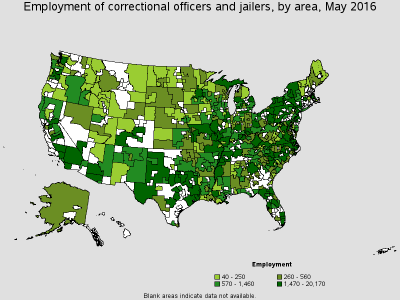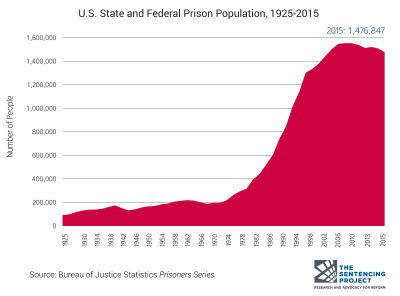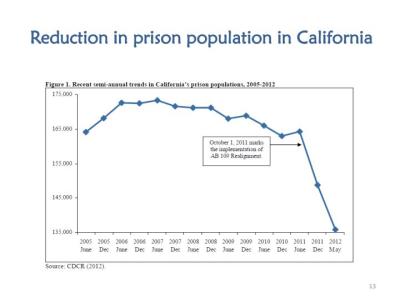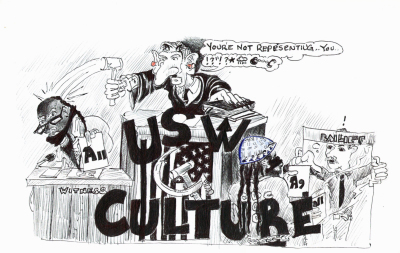
MIM(Prisons) on U.$. Prison Economy - 2018 update
The United $tates government, and society in general, spend an enormous amount of money on the criminal injustice system. The primary reason behind this expenditure, from the perspective of the government, is social control of oppressed nations within the United $tates.(see Politics of Mass Incarceration) But there are other beneficiaries, and losers, in this expensive criminal injustice system. In this article we will look at where the money comes from; who is benefiting and who is paying; and how these economic interests play into our strategy to organize against the criminal injustice system.
This is a follow-up to “MIM(Prisons) on U.S. Prison Economy” written in 2009. By periodically looking at these economic facts and trends we can gain insights into how the imperialist system operates and what strategies and tactics will be most effective in our struggle against imperialism.
Direct costs of prisons
Total spending on prisons and jails more than quadrupled over the thirty years between 1980 and 2010, from approximately $17 billion in 1980 to more than $80 billion in 2010. When including expenditures for police, judicial and legal services, the direct costs reached $261 billion.(1)
For comparison, in 2015 the United $tates “defense” budget was $637 billion, up from $379 billion in 1980, a 68% increase.(2,3) In that same period, total government spending on K-12 education more than doubled, going from $271 billion to over $621 billion.(3) So we can see the growth in criminal injustice system spending was dramatically faster than the growth in other government spending.
Hidden costs of prisons
Direct expenditures on prisons are just the tip of the iceberg in terms of the economic impact of prisons. One study, conducted in 2016, estimated the total aggregate burden of imprisonment at $1 trillion, with an additional $10 in social costs for every $1 spent on corrections. This means that most of that $1 trillion is being borne by families, community members, and prisoners themselves.(4)
Being locked up in prison comes with a lot of negative consequences beyond the obvious loss of years of one’s life spent behind bars. Economically these costs include lost wages, reduced earnings once on the streets, injuries sustained behind bars (from guards and other prisoners), and for some the ultimate price of death from fatal injuries while in prison, or a shorter life expectancy for prisoners. This totals up to annual costs of just under $400 billion dollars per year.
Estimated Costs borne by prisoners:(4)- Lost wages while imprisoned ($70.5 billion)
- Reduced lifetime earnings ($230.0 billion)
- Nonfatal injuries sustained in prison ($28.0 billion)
- Higher mortality rates of former prisoners ($62.6 billion)
- Fatal injuries to prisoners ($1.7 billion)
Beyond the direct costs to prisoners, family members and society in general carry an even larger financial burden. This includes direct costs like traveling for visitation of loved ones and moving costs when families can no longer afford their homes. But also less obvious costs like the impact prison has on family members which has been demonstrated to worsen the health and educational achievement of prisoners’ children, leaving some homeless, lead to higher rates of divorce and also reduce the marriage rate in the community. Further there are costs to society from homelessness of released prisoners, and reentry programs and others serving prisoners.
Estimates of Costs Borne by Families, Children, and Communities:(4)- Visitation costs ($0.8 billion)
- Adverse health effects ($10.2 billion)
- Infant mortality ($1.2 billion)
- Children’s education level and subsequent wages as an adult ($30.0 billion)
- Children rendered homeless by parental imprisonment ($0.9 billion)
- Homelessness of former prisoners ($2.2 billion)
- Decreased property values ($11.0 billion)
- Divorce ($17.7 billion)
- Reduced marriage ($9.0 billion)
- Child welfare ($5.3 billion)
These expenses disproportionately impact oppressed nation communities as the primary target of the criminal injustice system. A majority of prisoners are New Afrikan and Chican@, and this is a form of economic oppression against those nations. Unlike government expenditures which create jobs and fund industries, most of these expenses do not directly financially benefit anyone. This is just economic punishment piled on top of the punishment. The massive United $tates prison system is not just a tool of repression, it is actively worsening the economic conditions of oppressed nations, keeping significant sectors of these nations trapped in precarious conditions.
Prisons Create Jobs
While prisons have a devastating impact on oppressed nation communities in the United $tates, they play a different role for the disproportionately white employees of the criminal injustice system and the mostly rural communities in which these prisons operate.
Of the direct expenditures on prisons and jails, a lot of money goes to
jobs for guards and other correctional employees. In 2016 there were
431,600 guards in prisons and jails, earning on average $46,750 per year
or $22.48 per hour.(5)

We can see striking examples in states like New York and California where prisons are clustered in rural white communities (upstate New York and in the central valley of California), but they are imprisoning mostly oppressed nation people from urban communities.
In 2012 (the latest data available from the U.$. Bureau of Justice) the total number of criminal injustice system employees across federal, state and local governments was 2,425,011 of which 749,418 were prison staff.(6) About half of the total corrections budget goes to pay salaries for prison staff, which is two orders of magnitude more than the $400 million in profits of private prison companies.(17)
There are other jobs generated more indirectly by prison spending: construction jobs building and maintaining prisons, and jobs in all of the industries that supply the prisons with food, bedding, clothing, and other basics required to support the prison population. While some of these costs are recovered through prisoner labor (we will address this topic in more detail in ULK 62), the vast majority is still paid for by the government. Vendors also make a lot of money through commissary, phone bills, and other costs to prisoners. There are clearly a lot of individuals and corporations with an economic interest in the criminal injustice system.
Most prisons are in rural areas, often in poorer parts of states. Some prison towns are entirely centered around employment at the prison, or support services like hotels for visiting families. Others may have a more diversified economy but the prisons still provide a significant number of jobs for residents. These jobs give workers, and the community their jobs are supporting, a strong interest in seeing prisons stay full or grow bigger.
In reality, many jobs in newly-built prisons go to people from outside of the community where it was built. People with experience are brought in to fill these jobs. Many of these workers commute to the prison rather than relocate to a rural town. And there is some evidence that in the long run prisons are bad for the economy of rural communities. But this is definitely not a popular opinion as many communities lobby aggressively for prison construction. Once a prison is in place in a community, even if it’s not working out so well, it’s not easy to reverse course and change the economy. As a result some towns end up lobbying for building more prisons to help bolster their economy once they have one in place.(7)
Given the size of the criminal injustice system, and the many people employed in and around it, this is a big incentive to maintain Amerika’s crazy high imprisonment rates. It’s like a huge public works program where the government gives money to create jobs and subsidize corporations working in and around prisons.
State vs. Federal Funding
Most prison spending is at the state level. In 2010 state governments paid 57% of the direct cash costs, while 10% came from the federal government and 33% from local governments.(1) It’s all government money, but this fact is interesting because it means state economic interest is likely more important than federal economic interest in determining criminal injustice system spending.
Looking closer at state spending on prisons we find that imprisonment rates vary dramatically by state (8). Top states by imprisonment rate per 100,000 adults:
- Louisiana 1370
- Oklahoma 1340
- Mississippi 1230
- Alabama 1140
- Georgia 1140
- Texas 1050
- Arizona 1050
- Arkansas 1050
- All other states have rates under 1000 with a few states down in the 300s.
Prison populations are still growing in a few states, but in the top imprisonment rate states listed above only Arizona’s population grew between 2014 and 2015 (1.6%). Most of the states with an increase in imprisonment rate between 2014 and 2015 were very small states with smaller prison populations overall.(9)
There is a skewing towards high imprisonment rates in southern states. These are typically poorer states with fewer economic resources. It’s possible these states feel a stronger drive to build prisons as an economic growth tool, in spite of the evidence mentioned above now suggesting this isn’t necessarily the best path for towns to take. It’s an interesting “investment” decision by these poorer southern states that suggests there is more than just economics in play since it is a money-losing operation for already financially strapped states.
Just as the decrease in country-wide imprisonment rates coincided with the peak of the recession in 2008, it’s inevitable that economic interests by the states, and by the many employees of the criminal injustice system, are also influencing prison growth and prison shrinkage. In some cases it is a battle between the interests of the prison workers, who want prisons to grow, and the states that want to stop bleeding so much money into the prisons. In each state different conditions will determine who wins.
Economic Crisis and State Responses
In 2009, MIM(Prisons) looked at the potential of the economic crisis to motivate a reduction in prison populations to address state budget shortages. We cited a few examples painting that as an unlikely scenario. The statistics do show that the total imprisoned population has dipped since then. Here we revisit some of the big prison states to see how things have shaken out since 2008.

If anything, overcrowding continues to be a bigger issue in many states than funding issues. Though overcrowding may reflect a reluctance to build new facilities, which is related to budgets. Ohio just celebrated a modest decrease in their prison population at the end of 2017.(10) At 49,420, the population was a few thousands smaller than projected four years earlier when things weren’t looking so good.(11) But overall the numbers have just hovered around 50,000 since before the 2008 economic crisis.
Ohio was looking to the court-ordered prison population reduction in California as an example of what might happen there if they didn’t get their numbers under control. The California reduction (or “realignment”) was to address overcrowding in response to a lawsuit about conditions, and not budget problems. It was significant, with a reduction of almost 30,000 prisoners in the year following the “realignment.” Numbers are even lower today. However, county populations have increased as a result, with an estimated increase of 1 county prisoner for every 3 reduced in the state system. In other words, the county population was up over 10,000 people following the realignment.(12) Still California accounted for a majority of the decrease in prisoners in the United $tates since 2010.
Former Illinois Governor Pat Quinn canceled plans to close Pontiac Correctional Center back in 2009. But current Governor Bruce Rauner has a plan to reduce the population by 25% over the next decade, already having reduced it by thousands over a couple years.(13) The Illinois state system also remains over capacity at this time. However, Governor Rauner primarily cites fiscal concerns as eir motivation for the reforms.(14) Texas also recently reduced its population by 5,000, closing one prison. Both Texas and Illinois did this by putting more money into treatment programs and release resources.(14)
Pennsylvania has also implemented reforms in sentencing and preventing recidivism.(15) After the passing of the 2012 Justice Reinvestment Act, population numbers began to level off and even decrease by hundreds each year. Like Ohio, Pennsylvania’s population has been hovering around 50,000, and like many other states these numbers remain over capacity for the state (which is closer to 43,000).(16)
Overall we’re still talking about fairly marginal numbers here, and not a systematic transformation. We peaked at 2.3 million prisoners in the United $tates, and now we’re closer to 2.1 million. Still by far the highest imprisonment rate in the world. Ultimately, the economic crisis of 2008 did not have a huge impact on Amerikans because of the ability of imperialism to push crisis off on the periphery. But we can conclude from this experience that a serious economic crises is not enough to significantly change the course of the massive Amerikkkan injustice system.
Conclusions
Prisoners, their family and the community pay a heavy price for imprisonment, and this includes a significant financial cost. The impact on oppressed nation communities plays into the ongoing national oppression that is part of imperialism. So we shouldn’t be surprised by an imperialist society tolerating and even perpetuating these costs.
But prisons also cost the government a lot of money. And clearly these costs have not deterred the United $tates government from maintaining the highest imprisonment rate in the world. It’s a very expensive public works program, if all this money is being spent just to supply jobs to the many workers in and around the criminal injustice system. Although these jobs do provide significant political incentive to sustain prisons at their current level, Amerikan capitalist history provides us with plenty of examples of cheaper and more socially productive programs that create jobs for groups currently employed by the criminal injustice system. It’s clearly a political choice to continue with this expenditure and pour money into a costly system of social control.
Some anti-prison activists try to use the high costs of prison to their advantage, organizing around slogans that emphasize that this money could be better spent elsewhere, like on education. The 10-year aftermath of the 2008 economic crisis demonstrates the weakness of this approach. The social forces of change are not coming from state bureaucracy budget offices. The social force for change are the oppressed nations that are still being targeted by the out-of-control injustice system, and the lumpen organizations that come up as a means of self-defense from this oppression.
Related Articles:This article referenced in:
- Stop Funding Prison Services
- Fighting the System From Within
- Marxist Economics and Amerikan Mass Incarceration: Revisiting ULK 8
- Robbery by the FLDOC Canteen System
- 2018 Survey of U.S. Prisoners on Prison Labor
- Tulsi Gabbard Appeals to Amerikan Thinking on Injustice System
- LETTERS: Profits, Taxes, Investing, Fundraising and Weed
- Juneteenth Didn't Free Slaves in Prison









